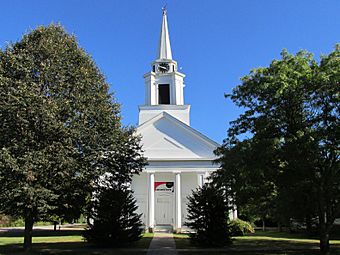Main Street Historic District (Fryeburg, Maine) facts for kids
Quick facts for kids |
|
|
Main Street Historic District
|
|

First Congregational Church
|
|
| Lua error in Module:Location_map at line 420: attempt to index field 'wikibase' (a nil value). | |
| Location | Main Street from Portland St. to about Swans Falls Rd., Fryeburg, Maine |
|---|---|
| Area | 55 acres (22 ha) |
| Architect | Multiple |
| Architectural style | Greek Revival, Italianate, Federal |
| NRHP reference No. | 91000324 |
| Added to NRHP | March 22, 1991 |
The Main Street Historic District in Fryeburg, Maine, is a special area that shows how the town's main village grew. It covers the time from about 1800 to 1935. This historic district stretches along Main Street, which is also parts of United States Route 302 and Maine State Route 5.
The district goes from Woodland Street in the north down to Portland Street in the south. It includes about forty important buildings. This area covers 55 acres (22 ha) of land. The Main Street Historic District was officially added to the National Register of Historic Places in 1991. This means it's a place recognized for its important history.
Contents
Exploring Fryeburg's Historic Main Street
This section tells you about the history and important buildings in the Main Street Historic District. It's like stepping back in time to see how Fryeburg grew.
How Fryeburg Began
Fryeburg was started in 1763 by a person named Colonel Joseph Frye. People began to settle there the next year. Before that, it was a village called "Pequawket," home to the Abenaki people.
The village grew in this spot because it had good land for farming. It also had easy access to the few roads and trails that existed back then. This area was also where Fryeburg's first meeting house was built. Today, the First Congregational Church stands in that same spot.
Important Buildings and Styles
The Main Street Historic District is home to many interesting buildings. Most of them are made of wood and were once homes. You can see different styles of architecture here.
Fryeburg Academy: A Center for Learning
The Fryeburg Academy was started in 1792, making the area even more important. Some of its buildings are part of this historic district. The main academy building is very notable. It was designed by Gridley James Fox Bryant and built in 1852-53. Later, wings were added in 1930 by John Calvin Stevens.
Oldest Homes and Unique Designs
The oldest building in the district is the Squire Chase House. It was built around 1767 by Nathaniel Merrill, one of Fryeburg's first owners. Over the years, it was changed to mix Federal and Italianate styles.
Most buildings here show Federal, Greek Revival, and Italianate styles. These were popular in the late 1700s and 1800s. There's also one special Shingle style house. It's called the Charles Goodnow House, built in 1895, and it's one of the best examples of that style in the whole county.
Other Key Buildings in the District
Besides the academy, other important buildings include the Casco Bank and Trust building. This brick building was built around 1822. The Burnham Jewelry Store is another interesting spot. It's a wooden building from 1903-1911 and is one of the best-kept old shops in town.
The Congregational Church was built between 1848 and 1850. It has a vestry, which is a room in a church, built in 1837. There's also an old wooden gas station from 1935.
Buildings with Special Recognition
Two buildings in the district are so important that they are listed separately on the National Register. One is the Chase House, famous for its connection to an early settler. The other is the Barrows-Steadman Homestead at 134 Main Street. This house has unique murals painted on the walls of an upstairs room. These paintings are thought to be by traveling artists Rufus Porter and Jonathan Poor.

